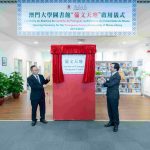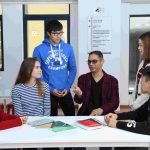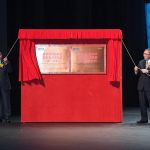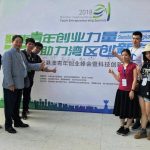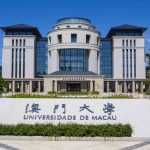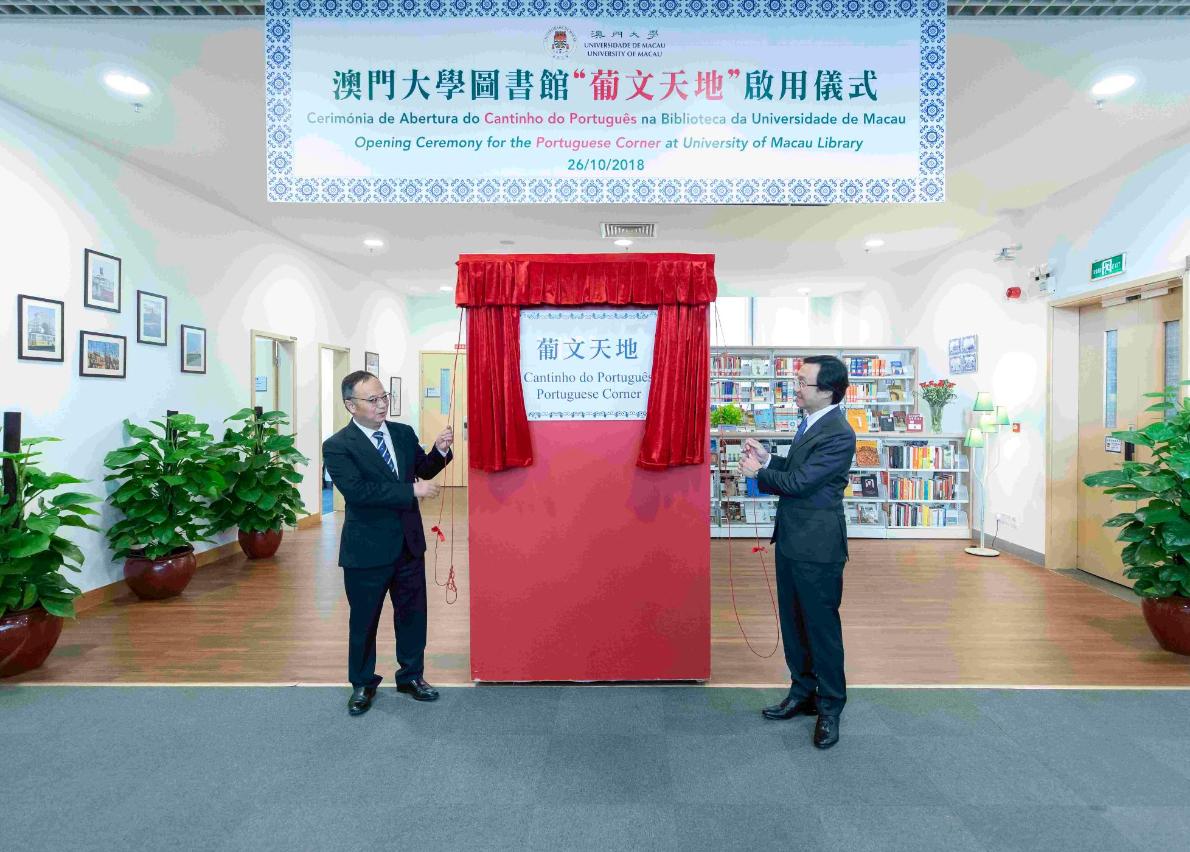 Secretary for Social Affairs and Culture Tam Chon Weng (right) and UM Rector Yonghua Song officiate at the opening ceremony for the Portuguese Corner
Secretary for Social Affairs and Culture Tam Chon Weng (right) and UM Rector Yonghua Song officiate at the opening ceremony for the Portuguese Corner
The Greater Bay Area spells new opportunities. Nurturing talented people to seize these opportunities sits high on the University of Macau’s (UM) agenda. In fact, the university has launched various talent development programmes, all designed to achieve the same goal: creating innovative talent with a competitive edge who know how to tap into Macao’s advantages. Rector Yonghua Song puts it this way: ‘In the future, UM’s first priority is to strengthen student training and help Macao stand tall as a centre for talent development and technological innovations on the west bank of the Pearl River.’
Encouraging Talented Residents to Seek Career Development in Macao
To support the Macao SAR government’s policy for ‘developing Macao through education’, UM in recent years has implemented a series of talent development programmes, with a clear focus on such areas as Chinese and Portuguese languages, Chinese history and culture, data science, innovation and entrepreneurship, physics, chemistry, and biological sciences. Moreover, it has launched the UM Macao Talent Programme to attract and nurture high-calibre professionals. The UM Macao Fellow Programme, which is part of the UM Macao Talent Programme, is targeted at talented Macao residents, encouraging them to seek career development in Macao. A number of young scholars from Macao have been appointed under this programme.
Nurturing Talent in Collaboration with Other Institutions in the Area
To increase the breadth and depth of education, UM maintains close collaborations with research institutes and companies in the Greater Bay Area, particularly in such areas as biomedical sciences, physics, and Chinese medical sciences. Ongoing collaborative projects include joint PhD programmes with Shenzhen University and the Southern University of Science and Technology, as well as undergraduate exchange programmes with Shenzhen University, Sun Yat-sen University, and the South China University of Technology. This year, UM successively initiated long-term collaborative projects with Hong Kong Baptist University, Sun Yat-sen University, Guangzhou University of Chinese Medicine, and the South China University of Technology. In addition to academic institutions, the university also seeks collaborations with associations and companies in mainland China, creating internship opportunities for students in public bodies, banks, car manufacturers, and other fields, so they can learn more about the Greater Bay Area.
Dedicated to Producing Chinese-Portuguese Bilingual Professionals
Developing Macao into a training base for Chinese-Portuguese bilingual language professionals is a focus of the Macao SAR government’s work. To support the SAR government’s effort in this area, UM has established the Chinese-Portuguese Bilingual Teaching and Training Centre (CPBTTC). The centre’s mission is multifaceted: promoting reforms in Portuguese language education; supporting the training of high-calibre Chinese-Portuguese bilingual professionals, with focus on training Portuguese language teachers and translators; assisting local talent to tap into Macao’s role as a service platform for business collaboration between China and Portuguese-speaking countries; and supporting the Greater Bay Area in taking the lead and setting an example for the nation’s participation in high-level international collaboration. In October this year, the Department of Portuguese established a Portuguese Corner in collaboration with the UM library in order to stimulate interest in learning Portuguese on campus. On the front of training legal professionals with bilingual proficiency in Chinese and Portuguese, the Faculty of Law in the 2014/2015 academic year launched a five-year bachelor of law programme, conducted in Chinese and Portuguese. The first cohort of students enrolled in this programme is expected to graduate next year. So far, 110 students have had the chance to study Portuguese at a Portuguese university through this programme. Rector Song says UM has a strong faculty team and excellent learning facilities and environment, adding that in recent years the university has spared no effort in promoting exchange activities with institutions in mainland China and Portuguese-speaking countries, in order to produce more outstanding Chinese-Portuguese bilingual professionals to meet the needs of the fast-developing Macao and Greater Bay Area.
Supporting Smart City Development via Cutting-edge Research
Science and technology are a primary productive force. This year, UM received approval from the Ministry of Science and Technology for establishing the State Key Laboratory of Internet of Things for Smart City (University of Macau), bringing the total number of state key labs at the university to 3 (the other two labs are in microelectronics and Chinese medical sciences). This new state key lab will carry out basic research in related fields, and will make policies, science, technology, education, application, and industrial development into an integrated whole. It will follow a blueprint that places an emphasis on four areas, namely city development, basic research, talent development, and serving Macao, to support the creation of a smart city in Macao and to inject a fresh impetus to the Greater Bay Area. The university will also launch a new bachelor of science programme in mathematics, with specialisation in statistics and data science, as well as a master’s programme in data science. Rector Song says these programmes aim to train local talent so as to contribute to the development of the Greater Bay Area, especially in data science and smart city development.
Stimulating the Youth’s Interest in Science via Education Bases
In addition to providing quality higher education, UM also takes it upon itself to educate the younger generation in Macao by sharing teaching resources with secondary and primary schools. In June this year, UM established the Macao Base for Primary & Secondary STEM Education, and the Macao Base for Primary & Secondary Education in Humanities & Social Sciences, which represent the university’s effort in designing a strategy for a panoramic vision that takes in basic education, higher education, and community resources, a vision that has the full support of the government. The base for STEM Education organised a series of science summer camps in July and August this year. It is now in the process of launching a series of STEM programmes. The Confucius Institute under the base for education in humanities and social sciences will collaborate closely with the Chinese-Portuguese Bilingual Teaching and Training Centre to organise training courses and other activities for teachers and students from local secondary and primary schools.
Increasing Students’ Competitiveness via Business Incubator
When it comes to the future of the Greater Bay Area, ‘innovation’ and ‘entrepreneurship’ are the keywords. For the youth in Guangdong, Hong Kong, and Macao, the Greater Bay Area has enormous scope for professional development. To better prepare students for these opportunities, UM has not only launched courses in innovation and entrepreneurship, but has also selected student teams with entrepreneurial potential for business incubation in the university’s Centre for Innovation and Entrepreneurship. With these and other strategies, UM hopes to increase the competitiveness of the youth in Macao and support their entrepreneurial attempts in the Greater Bay Area.


